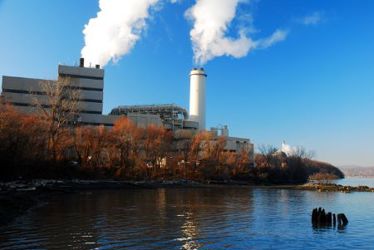Hudson River Advocates Attempt To Block Discharge Plan For Radioactive Wastewater


More than two years since it was shut down, the Indian Point nuclear power plant near New York City still holds more than a million gallons of radioactive wastewater as stakeholders debate a plan for disposal into the Hudson River.
“Supporters of the planned releases say they are just like those made when Indian Point was producing power and that the concentration of tritium has been far below federal standards,” the Associated Press reported. “But opponents along the river question the health and safety claims. They say the releases of radioactive water could be a step back for a once notoriously polluted river that is now a popular summer attraction for sailors, kayakers and swimmers.”
Recently, a bill banning radiological discharges into the Hudson River was approved by the New York State Assembly. Nearby communities have passed resolutions opposing the discharges and an online petition pushing for action against them has garnered hundreds of thousands of signatures. Of particular concern is the presence of tritium in the wastewater.
But the plant’s decommissioning, which has been operated by a company called Holtec International, has been ongoing since 2012 and wastewater discharges into the river have been permitted as part of that process.
“Similar releases are made by other nuclear plants, as well as hospitals and wastewater treatment facilities, Holtec spokesman Patrick O’Brien said,” according to AP. “The Hudson releases have been safe and have had ‘very, very low’ levels of tritium, he said.”
If the state bill is approved by the Legislature, Holtec would have to find another solution to remove the years-old wastewater. At an estimated cost of $2.3B and a projected 12-year timeline, the decommissioning project hardly needs any additional obstacles. But those concerned about the impact it could have on source water or drinking water quality are hoping to cause a delay that leads to an alternative plan.
“Critics say the release of any radioactive material into the Hudson should be avoided if there are viable alternatives,” per ABC News. “Tracy Brown, president of the environmental group Riverkeeper, said storing the water on-site for 12 years or so would give Holtec time to explore long-term options to separate the tritium.”
To read more about how nuclear facilities handle wastewater discharges, visit Water Online’s Power Generation Solutions Center.
